Should parents avoid feeding peanuts to their little ones? For a long time this has been the recommendation. The concern was that the baby could experience a life-threatening allergy. However, as more studies are done, doctors may rethink their original recommendation.
Though far from being the first of its kind, a recent study yet again eases the minds of parents who have permitted peanuts into their youngster’s diet. Conducted by the Children’s Hospital Research Institute of Manitoba (CHRIM) and published in the Journal of Allergy and Clinical Immunology: In Practice – the clinical trial compared the data of more than 2,600 Canadian children to determine whether peanut avoidance affected the risk of allergy.
Data indicated that babies who did not consume peanuts within their first year of life were four times more likely to have a peanut allergy at the age of three than those that had consumed peanut-containing foods by age one. In short, their conclusion outright contradicts popular medical recommendations regarding peanut consumption among infants.
“Even when we excluded high-risk children, early peanut introduction was associated with a lower risk of peanut allergy by age three,” said lead researcher Dr. Elinor Simons of the University of Manitoba and the CHRIM. “This means that low-risk children may also benefit from early introduction of peanut.”
In addition, researchers found that peanut allergy risk was likely to increase even further if parents continued to avoid consumption after the age of one. Those who did not have peanuts in their diet by the age of 18 months were seven times more likely to suffer an allergy to peanuts than those who had already consumed them.
“This tells us that if peanut is not introduced before the age of 12 months, it should still be introduced as soon as possible,” Simons said. “This study’s findings should reassure parents, caregivers and healthcare professionals about the benefits of early peanut introduction for all children,” Simons said.
Still, parents should introduce peanuts with the guidance of their child’s pediatrician. Those considered to be high-risk should also consult their child’s physician before introducing the potentially allergy-inducing food.







